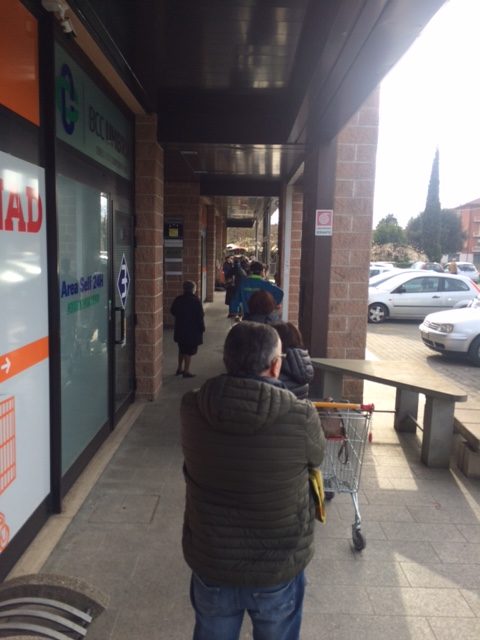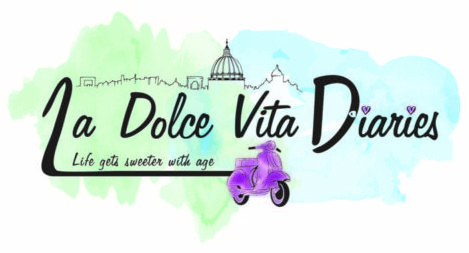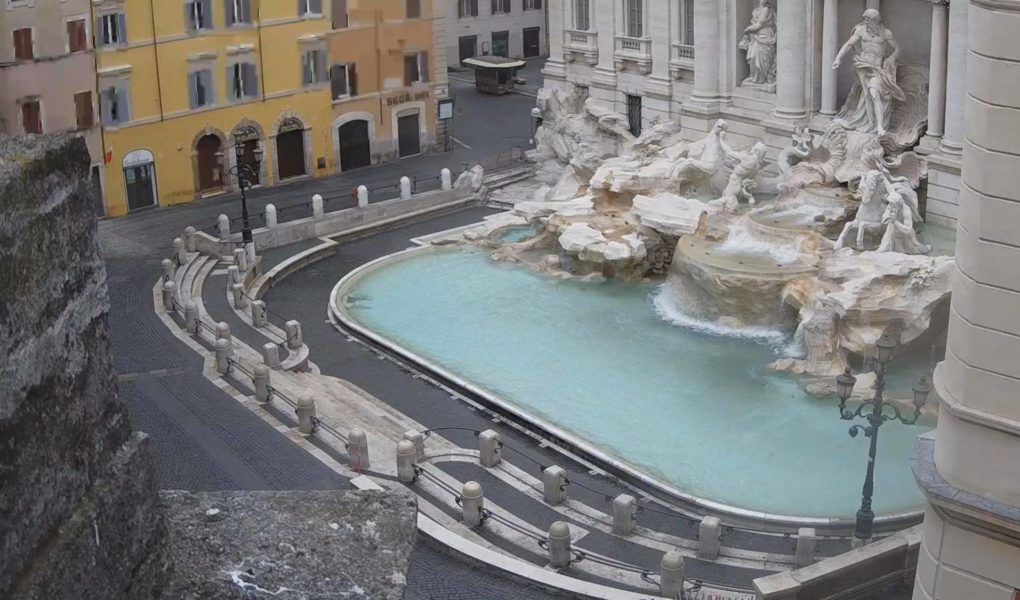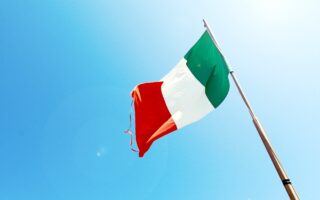lockdown [ lok-doun ]
noun
the confining of prisoners to their cells, as following a riot or other disturbance. a security measure taken during an emergency to prevent people from leaving or entering a building
The day life changed
It’s been four days since we woke up to news that the country was on total lockdown. From the top to the bottom of this beautiful ancient peninsula we call home, every city, every village, every corner of one of the world’s most visited countries is shut down.
No restaurants, bars, shops, non-essential stores are open for business.

Overnight, life as we knew it changed.
We can no longer gather in each other’s homes and share a meal. We can’t walk down cobble-stoned streets arm-in-arm, grab a cappuccino in the town piazza and greet friends strolling by.

And toughest of all, we can no longer embrace and kiss each other.
After all, a bacio could literally be the kiss of death.
The invisible killer
The first cases of coronavirus in Italy arrived in late January when two Chinese tourists in Rome tested positive for the deadly disease. Followed shortly afterward by the diagnosis of a 38 year-old Italian man from Northern Italy who had recently returned from traveling to Wuhan, China – the birthplace of the outbreak.
The virus quickly caught hold of the Lombardy region and spread its tentacles across the country. Italy now has the highest rate of infections in the world outside of China.
Many people have asked why Italy? Well for starters, Italy has one of the world’s oldest populations with 60% of people over the age of 40. It’s well documented that the virus is killing mainly elderly people and those with underlying health conditions.
What isn’t talked about as frequently is the number of people who have – and are – recovering from the disease. More people have lived to tell the tale than perished from the illness. We can only hope that the drastic measures taken to restrict the daily movement of 60 million people here in Italy will finally contain and eventually eradicate the spread of this deadly virus.
How Italy is coping
For a country that bears the brunt of jokes about lazy work ethic and a general lackadaisical approach to getting things done, the Italian government’s response to the crisis had been astonishingly swift and decisive.

Lockdown measures were put in place across the country along with the request – and then order- not to venture outside of your own Comune or jurisdiction without a good reason.
In our case, we live in Paciano, Italy’s smallest Comune. There are about 900 people in our region and only about 100 within the historical center walls where we have lived for the past few years. There is a small grocery store and two bars (now closed) and a pharmacy that remains open, allowing one person in a time.
The grocery stores now how have long lines of masked customers, waiting for their turn to enter four at time to do a quick shop. Everywhere there are lines taped to the floor, clearly marking the one-meter distance you must respect. My pet peeve of Italians hovering close enough to feel their breath on your neck in a checkout line is now a distant memory.

Every morning we wake up to news of more changes. More rules. Today, Peter went out to brave the lineups for groceries and overheard they are closing down more stores tomorrow. Police checkpoints are now at town entrances guarding the comings and goings of townsfolk.
The message is loud and clear. Stay home.
The silver lining of slowing down
There is much information online about the virus – it’s symptoms, health implications, worldwide reach, numbers, statistics, national policies, and the international race to find a vaccine. You can research and read all you want on the internet.
I want to talk about how the crisis created by this new virus has affected our daily life. My husband Peter woke up on Day 2 of the lockdown and said, ‘There are some good things about this lockdown. It is forcing the world to slow down. To step back and take a breath and just be for a while.’
My ever-optimistic husband had found the silver lining in an otherwise devastating situation. And he is right. All around us we are hearing stories of how our friends and neighbors are whiling away the hours now mandated to spend at home.
From Aldo who has run the village bar in neighboring medieval Panicale every day and night for 40 years who now has time to prune his own olive trees, be at home for a lovely lunch with his wife and crack open a bottle of his best red wine to savor at sunset.

To the effervescent American expat Laurie – who always finds the light in a dark day – posting beautiful photos of the delicious dishes she is whipping up from the stores in her pantry. And my eclectic group of book club ladies who devised a clever way to share our latest book review through an email chain.
Life finds a way.
No end in sight
As we close in on our first full week of lock down, there appears to be no end in sight. The longer it goes on, the greater the hardship on people and families who need to get to work and businesses who thrive on the tourist industry. Even though we all know the lockdown is for our own good, it is difficult to imagine how we will cope if it continues for a long period.
To ease some of the burden, the government has suspended mortgage payments and taxes. Volunteer-based home delivery systems have been set up for those unable to get out and buy their own groceries.
Italy has risen to the challenge of this crisis. It makes me proud to be Italian.
Getting through an international health crisis isn’t just about healing the body. It’s also about caring for the soul, keeping our spirits up and giving us hope. So how do Italians cope with being cooped up? They sing.
From windows and terraces. Voices and instruments soaring high over the deserted streets of cities like Rome and Naples and small remote villages of Tuscany and Catania.
They sign songs of fellowship, national pride and love.
They sing to remind us we are all in this together. If we can’t caress each other in an embrace or a kiss, we can touch each other’s hearts with our words.
And maybe if we sing loud enough, we can blow away the dark clouds that have descended upon our much-loved land.
Until then, to your health.
A presto
Anna
I would like to acknowledge Claudia Viggiani for the use of her Rome FB photos – since I can’t go out to take them myself www.claudiaviggiani.com








It’s such a strange time. Way to go Peter for looking on the bright side. There is a lot of fear and stress over this pandemic but I think we all need to focus on the positive. I can’t help but look forward to all the new babies that will be born following this. No sports to watch on tv? No problem. Create your own. 😉
Thank you, Anna, for your sensitive description of daily life in Italy under quarantine. I am glad to know that you and Peter are virus free.
Leo C.